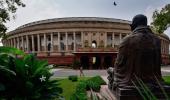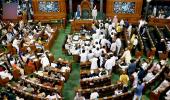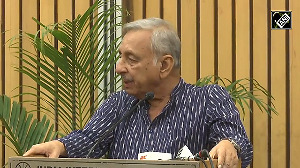The richest Rajya Sabha MPs have gotten significantly richer -- to nearly quadruple from around Rs 20 crore in 2013 to nearly Rs 80 crore in 2022.

The Rajya Sabha, 10 seats of which are due for elections on July 24, may be keenly watched for the age profile of new entrants.
India's Upper House of the Parliament has a smaller share of young people than in many peer economies.
Globally, about 13 per cent of the occupants of the Upper House were below 45 years.
The share of the young in India's Upper House stood at 7.5 per cent.
Peers like Brazil, Russia, and South Africa had a higher representation of younger people (see chart 1).

Despite an ageing population, about 10 per cent in the Japanese Upper House was under 45 years of age, ahead of India.
Around a third of Japan's population is over 65 years, compared to 7 per cent in India.
Changes to the age profile of India's House of Elders has been slow, though some progress is seen since 2018.
About 57 per cent of the sitting members of the Rajya Sabha in 2022 were 60 years of age or below, higher than in 2018 and 2020.
Yet, the age profile in 2013 was far younger (see chart 2).

Meanwhile, the concentration of riches in the Rajya Sabha has been going up.
The median Rajya Sabha Member of Parliament had assets above Rs 5 crore in 2022, compared to under Rs 2 crore in 2013.
The richest members have gotten significantly richer, causing the average assets of Rajya Sabha members to nearly quadruple from around Rs 20 crore in 2013 to nearly Rs 80 crore in 2022.
Average assets are up 43 per cent from 2018 (see chart 3).

Apart from reflecting a larger trend in Indian politics, richer parliamentarians are the outcome of conscious decision-making, according to Major General (retired) Anil Verma, head of the Association for Democratic Reforms.
"In a span of four years from 2018 to 2022, this increase in the average assets of Rajya Sabha MPs is not normal. This establishes the fact that political parties are giving tickets to richer candidates," the general points out.
The gender profile of the House has, however, improved. The share of women in the has risen from 8.8 per cent in 2013 to 13.7 per cent. (see chart 4)

Feature Presentation: Aslam Hunani/Rediff.com












 © 2025
© 2025